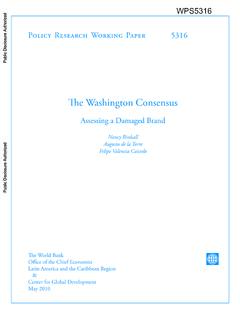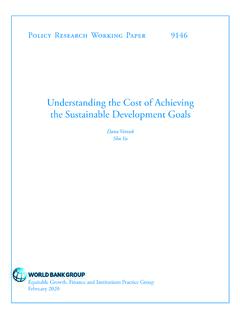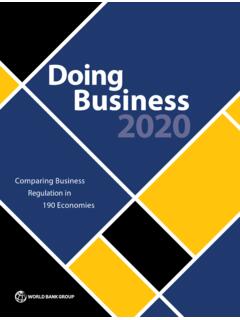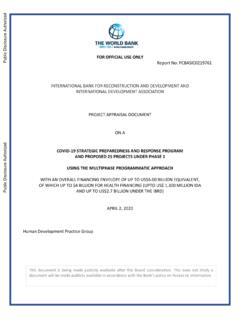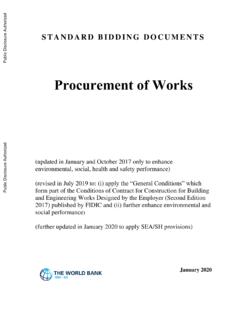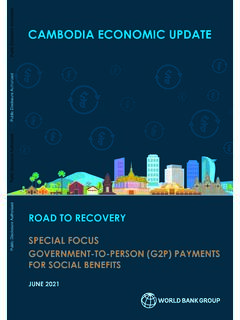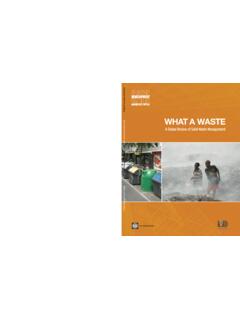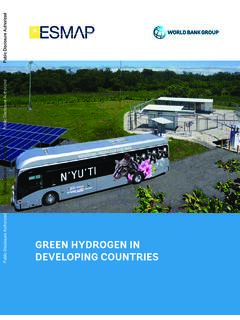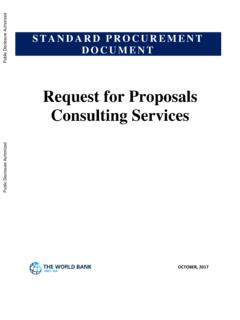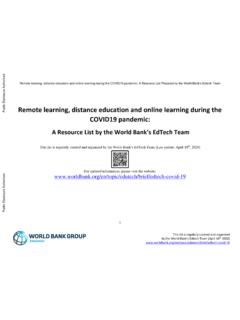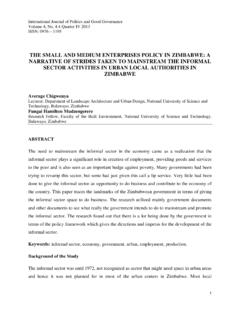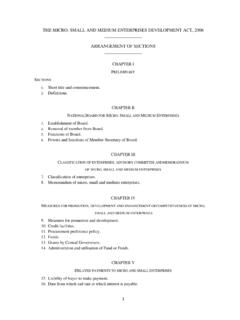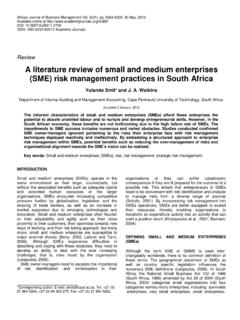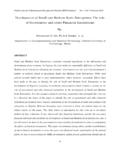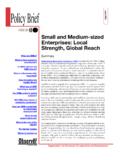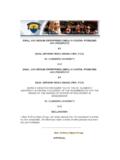Transcription of Small and Medium Enterprises in the Pandemic - World Bank
1 policy Research Working Paper9414 Small and Medium Enterprises in the PandemicImpact, Responses and the Role of Development FinanceIkmal AdianDjeneba DoumbiaNeil GregoryAlexandros RagoussisAarti ReddyJonathan TimmisInternational Finance CorporationEconomics and Private Sector Development Vice PresidencySeptember 2020 Public Disclosure AuthorizedPublic Disclosure AuthorizedPublic Disclosure AuthorizedPublic Disclosure AuthorizedProduced by the Research Support TeamAbstractThe policy Research Working Paper Series disseminates the findings of work in progress to encourage the exchange of ideas about development issues. An objective of the series is to get the findings out quickly, even if the presentations are less than fully polished.
2 The papers carry the names of the authors and should be cited accordingly. The findings, interpretations, and conclusions expressed in this paper are entirely those of the authors. They do not necessarily represent the views of the International Bank for Reconstruction and Development/ World Bank and its affiliated organizations, or those of the Executive Directors of the World Bank or the governments they Research Working Paper 9414 This study highlights how COVID-19 has affected Small and Medium Enterprises , drawing on newly released World Bank enterprise Surveys in 13 countries. The study shows that firms of all sizes are severely affected in multiple dimen-sions; however, firm size matters for the intensity of the different channels of transmission and firms responses.
3 Small and Medium enterprise sales shrink by more and their cash drains faster than large firms in the same sector and country. Among them, faster growing firms experi-ence the demand shock somewhat less severely, but they are more exposed to international trade disruption, supply, and finance shocks. Yet, a range of firm responses to the downturn seem to be out of reach. Fewer Small and medi-um-size Enterprises , for example, start remote work, leaving their workers exposed to health risks. To make it through the Pandemic , the majority of smaller firms do not turn to banks for loans; they need grants. Although development finance is not enough to fill the financing gap, development finance institutions are relevant in investment mobiliza-tion, demonstration, and know-how as economies move toward recovery and rebuilding.
4 Delivering these requires rapid efforts to build partnerships and gather information in places where development finance has been limited in the paper is a product of the Economics and Private Sector Development Vice Presidency, International Finance Corporation. It is part of a larger effort by the World Bank to provide open access to its research and make a contribution to development policy discussions around the World . policy Research Working Papers are also posted on the Web at The authors may be contacted at and Small and Medium Enterprises in the Pandemic : Impact, Responses and the Role of Development Finance Ikmal Adian Djeneba Doumbia Neil Gregory Alexandros Ragoussis Aarti Reddy Jonathan Timmis Keywords: Small and Medium Enterprises ; COVID19; Pandemic Response; Development Finance JEL Codes: L23; L25; O12.
5 O19 1 The authors are grateful to Leonardo Iacovone, Nazim Tamkoc and Domenico Viganola for detailed and helpful reviews of earlier versions, as well as Manuela Adl, Momina Aijazuddin, Matthew Gabriel Brown, Martin Holtmann, Shoghik Hovhannisyan, Dan Goldblum, Rohit Jain, Filip Jolevski, Sophie Osotimehinand, Asad Zaman, and Zihao Zheng, for sharing data and estimates used in this study. 2 1. Introduction It took three weeks for a quarter of businesses in the United Kingdom to shut down when mobility restrictions were announced at the end of March In the United States and other places contraction has been equally By July 2020, five months after the coronavirus COVID-19 started to spread globally, the global economy was facing unforeseen and rising hardship; millions of workers remained unemployed; while trade, investment and financial markets had collapsed.
6 Yet, the impact of the Pandemic has not been equally spread across countries, sectors, and firms of different sizes. This study focuses on how Small and Medium Enterprises (SMEs), employing fewer than 100 workers, have been experiencing the shock. The study discusses differences in the impact of the Pandemic across firms of different sizes, but also their responses and how development finance can support them best in low- and middle-income countries. The focus on smaller firms is meaningful for many reasons. SMEs are the largest source of employment and delivery of goods and services in lower income economies; hence disruptions to this segment have major social and welfare implications for the poor and rural populations.
7 What is more, permanent closures of Small Enterprises result in a loss of intangible capital, skills and innovation capacity that risk locking countries into deep recessions long after the Pandemic . A range of development objectives whether it be supporting incomes of the poor during the downturn, providing goods and services, or setting the right foundations for recovery and industrial development of the future - are therefore directly associated to what happens to SMEs during the crisis. The availability of data is the single most important constraint to our understanding of the effects of the Pandemic on business. Beyond a handful of high-income economies, in the United States and Europe, it has not been possible to track the many dimensions of impact at the pace they have been unfolding.
8 In low- and middle-income countries the sources of information are few. By the end of July 2020, the World Bank had released new enterprise surveys from 13 different countries measuring the virus s impact on businesses - from Italy and the Russian Federation, to Albania and Zimbabwe (see Annex Table A1 for sample description). Despite their limitations,4 the surveys, along with a variety of other sources used in this study, are telling as to how Small businesses experience the shock differently than larger firms. Without sales, half of businesses expect to shut down in less than a month according to the evidence. It is impossible to predict how many will make it through the Pandemic as many close 2 Financial Times, 16 April 2020: Covid-19 shuts down a quarter of UK businesses.
9 3 Washington Post, 12 May 2020: Small business used to define America s economy. The Pandemic could change that forever. 4 The 13 countries for which follow-up surveys were released by July 2020 are located in two regions - Europe and Sub-Saharan Africa, with surveys in other regions scheduled for completion in fall 2020. Moreover, in all World Bank enterprise Surveys, informal and micro- Enterprises (with fewer than 5 employees) are not surveyed; neither are cooperative and 100% state-owned firms. The surveys encompass a broad range of industries: manufacturing, construction, wholesale and retail, hotels, transport and computer related services (ISIC Rev codes 15-37, 45, 50-52, 55, 60-64, and 72).
10 However, this omits some sectors with a preponderance of SMEs, such as agriculture or mining, and some services sectors that are highly affected by the crisis, such as financial services, education or health services. 3 temporarily, just delaying payments. Firms of all sizes, large and Small , are severely affected. The strongest predictor of variation in impact across firms is in fact the combination of country-sector where they operate; in other words, market conditions. Firm size, however, makes a difference in the intensity of the different channels of transmission; a conclusion that is robust to a wide range of alternative tests, controls and weights. SMEs struggle more with reduced demand during the downturn their sales shrink by more than large firms, and their cash drains faster.
